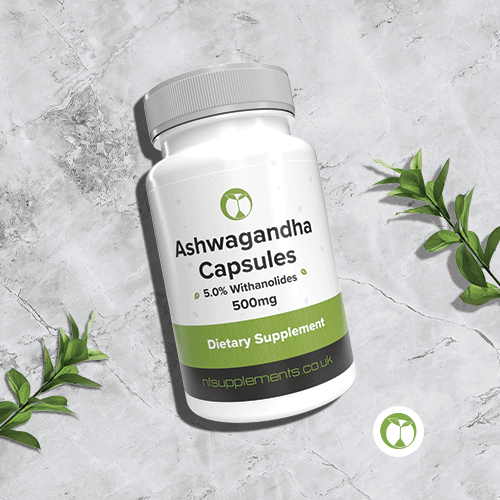Ashwagandha Capsules - Reduce Stress & Anxiety
84%
Felt Less Stressed
79%
Had Better Sleep
81%
Said Mood Improved

Ashwagandha Capsules - Reduce Stress & Anxiety
- Lowers Stress
- Improves Mood
- Improves Sleep
- Is Ashwagandha for you?
Ashwagandha is suitable for you if you tick any of these boxes:
- You want help improving stress and anxiety levels
- You want to improve sleep quality
As Seen On

As Featured In












SEE WHAT OUR CUSTOMERS ARE SAYING
Published Clinical Studies

KSM-66 Ashwagandha For Stress And Anxiety
A prospective, randomized double-blind, placebo-controlled study of safety and efficacy of a high-concentration full-spectrum extract of Ashwagandha root in reducing stress and anxiety in adults.Chandrasekhar, K., Kapoor, J., & Anishetty, S. (2012). Indian journal of psychological medicine, 34(3), 255.
Results: The treatment group that was given the high-concentration full-spectrum Ashwagandha root extract exhibited a significant reduction (P<0.0001) in scores on all the stress-assessment scales on Day 60, relative to the placebo group. The serum cortisol levels were substantially reduced (P=0.0006) in the Ashwagandha group, relative to the placebo group. The adverse effects were mild in nature and were comparable in both the groups. No serious adverse events were reported.
Conclusion: The findings of this study suggest that a high-concentration full-spectrum Ashwagandha root extract safely and effectively improves an individual’s resistance towards stress and thereby improves self-assessed quality of life.

KSM-66 Ashwagandha For Testosterone Male Sexual Function
Clinical Evaluation of the Spermatogenic Activity of the Root Extract of Ashwagandha (Withania somnifera) in Oligospermic Males: A Pilot StudyAmbiye, V. R., Langade, D., Dongre, S., Aptikar, P., Kulkarni, M., & Dongre, A. (2013). Evidence-Based Complementary and Alternative Medicine, 2013.
Results: There was a 167% increase in sperm count (9.59 ± 4.37 × 106/mL to 25.61 ± 8.6 × 106/mL; ), 53% increase in semen volume (1.74 ± 0.58 mL to 2.76 ± 0.60 mL; ), and 57% increase in sperm motility (18.62 ± 6.11% to 29.19 ± 6.31%; ) on day 90 from baseline. The improvement in these parameters was minimal in the placebo-treated group. Furthermore, a significantly greater improvement and regulation were observed in serum testosterone levels with the Ashwagandha treatment as compared to the placebo (p<0.001).
Conclusion: The present study adds to the evidence on the therapeutic value of Ashwagandha (Withania somnifera), as attributed in Ayurveda for the treatment of oligospermia leading to infertility.

KSM-66 Ashwagandha For Cardio respiratory Endurance
Examining the effect of Withania somnifera supplementation on muscle strength and recovery: a randomized controlled trialWankhede, S., Langade, D., Joshi, K., Sinha, S. R., & Bhattacharyya, S. (2015). Journal of the International Society of Sports Nutrition, 12(1), 43.
Results: Compared to the placebo subjects, the group treated with ashwagandha had significantly greater increases in muscle strength on the bench-press exercise (Placebo: 26.4 kg, 95 % CI, 19.5, 33.3 vs. Ashwagandha: 46.0 kg, 95 % CI 36.6, 55.5; p = 0.001) and the leg-extension exercise (Placebo: 9.8 kg, 95 % CI, 7.2,12.3 vs. Ashwagandha: 14.5 kg, 95 % CI, 10.8,18.2; p = 0.04), and significantly greater muscle size increase at the arms (Placebo: 5.3 cm2, 95 % CI, 3.3,7.2 vs. Ashwagandha: 8.6 cm2, 95 % CI, 6.9,10.8; p = 0.01) and chest (Placebo: 1.4 cm, 95 % CI, 0.8, 2.0 vs. Ashwagandha: 3.3 cm, 95 % CI, 2.6, 4.1; p < 0.001). Compared to the placebo subjects, the subjects receiving ashwagandha also had significantly greater reduction of exercise-induced muscle damage as indicated by the stabilization of serum creatine kinase (Placebo: 1307.5 U/L, 95 % CI, 1202.8, 1412.1, vs. Ashwagandha: 1462.6 U/L, 95 % CI, 1366.2, 1559.1; p = 0.03), significantly greater increase in testosterone level (Placebo: 18.0 ng/dL, 95 % CI, -15.8, 51.8 vs. Ashwagandha: 96.2 ng/dL, 95 % CI, 54.7, 137.5; p = 0.004), and a significantly greater decrease in body fat percentage (Placebo: 1.5 %, 95 % CI, 0.4 %, 2.6 % vs. Ashwagandha: 3.5 %, 95 % CI, 2.0 %, 4.9 %; p = 0.03).
Conclusion: This study reports that ashwagandha supplementation is associated with significant increases in muscle mass and strength and suggests that ashwagandha supplementation may be useful in conjunction with a resistance training program.

KSM-66 Ashwagandha For Testosterone, Muscle Strength And Recovery
Examining the effect of Withania somnifera supplementation on muscle strength and recovery: a randomized controlled trial Wankhede, S., Langade, D., Joshi, K., Sinha, S. R., & Bhattacharyya, S. (2015). Journal of the International Society of Sports Nutrition, 12(1), 43.
Results: Compared to the placebo subjects, the group treated with ashwagandha had significantly greater increases in muscle strength on the bench-press exercise (Placebo: 26.4 kg, 95 % CI, 19.5, 33.3 vs. Ashwagandha: 46.0 kg, 95 % CI 36.6, 55.5; p = 0.001) and the leg-extension exercise (Placebo: 9.8 kg, 95 % CI, 7.2,12.3 vs. Ashwagandha: 14.5 kg, 95 % CI, 10.8,18.2; p = 0.04), and significantly greater muscle size increase at the arms (Placebo: 5.3 cm2, 95 % CI, 3.3,7.2 vs. Ashwagandha: 8.6 cm2, 95 % CI, 6.9,10.8; p = 0.01) and chest (Placebo: 1.4 cm, 95 % CI, 0.8, 2.0 vs. Ashwagandha: 3.3 cm, 95 % CI, 2.6, 4.1; p < 0.001). Compared to the placebo subjects, the subjects receiving ashwagandha also had significantly greater reduction of exercise-induced muscle damage as indicated by the stabilization of serum creatine kinase (Placebo: 1307.5 U/L, 95 % CI, 1202.8, 1412.1, vs. Ashwagandha: 1462.6 U/L, 95 % CI, 1366.2, 1559.1; p = 0.03), significantly greater increase in testosterone level (Placebo: 18.0 ng/dL, 95 % CI, -15.8, 51.8 vs. Ashwagandha: 96.2 ng/dL, 95 % CI, 54.7, 137.5; p = 0.004), and a significantly greater decrease in body fat percentage (Placebo: 1.5 %, 95 % CI, 0.4 %, 2.6 % vs. Ashwagandha: 3.5 %, 95 % CI, 2.0 %, 4.9 %; p = 0.03).
Conclusion: This study reports that ashwagandha supplementation is associated with significant increases in muscle mass and strength and suggests that ashwagandha supplementation may be useful in conjunction with a resistance training program.

KSM-66 Ashwagandha For Female Sexual Function
Efficacy and Safety of Ashwagandha (Withania somnifera) Root Extract in Improving Sexual Function in Women: A Pilot Study Dongre, S., Langade, D., & Bhattacharyya, S. (2015). BioMed research international, 2015.
Results: The analysis indicates that treatment with HCARE leads to significantly higher improvement, relative to placebo, in the FSFI Total score (p < 0.001), FSFI domain score for “arousal” (p < 0.001), “lubrication” (p < 0.001), “orgasm” (p = 0.004), and “satisfaction” (p < 0.001), and also FSDS score (p < 0.001) and the number of successful sexual encounters (p < 0.001) at the endof the treatment.
Conclusion: This study demonstrated that oral administration of HCARE may improve sexual function in healthy women.

KSM-66 Ashwagandha For Stress And Weight Management
Body Weight Management in Adults Under Chronic Stress Through Treatment With Ashwagandha Root Extract: A Double-Blind, Randomized, Placebo-Controlled Trial Choudhary, D., Bhattacharyya, S., & Joshi, K. (2017). Journal of evidence-based complementary & alternative medicine, 22(1), 96-106.
Results: KSM-66 Ashwagandha caused significant reduction in Perceived Stress among the subjects. At the end of the study, KSM-66 Ashwagandha produced a 32.74% reduction in PSS scores from the baseline compared to placebo group. KSM-66 Ashwagandha reduced desire or cravings for food in the study subjects. The FCQ scores for Planning, Positive and Negative reinforcement, Lack of control, Emotion and Environment domains were reduced significantly (P < 0.05) in the Ashwagandha supplemented subjects. A statistically significant (P < 0.05) decrease of 22.2% was observed in serum cortisol (a stress hormone) levels as a result of KSM-66 Ashwagandha supplementation compared to placebo group. KSM-66 Ashwagandha supplementation resulted in a 3.0% and 2.9% reduction in bodyweight (P < 0.05) and BMI (P < 0.05) respectively. Supplementation with KSM-66 Ashwagandha resulted in a significant (P < 0.05) increase in OHQ scores and a significant (P < 0.05) reduction in TFEQ scores for ‘Uncontrolled’ and ‘Emotional Eating behavior’ compared to placebo group.
Conclusion: The outcome of this study suggests that Ashwagandha root extract can be used for body weight management in adults under chronic stress.

How to use
-
ONE PER DAY
Take one 500mg capsule daily, ideally in the morning.
-
WITH OR WITHOUT FOOD
Ashwagandha can be taken with food or on an empty stomach. However, the impact of food on supplement absorption is often unpredictable as different compounds within food can interact with the supplement in different ways.
On the other hand, taking Ashwagandha with food will slow absorption, which can be beneficial if you want the effects to kick in slower or if you experience nausea when taking the supplement on an empty stomach.
Frequently Asked Questions
-
Are there any side effects?
The majority of clinical trials of ashwagandha have not observed adverse side effects. In rare cases, the supplement may cause diarrhoea or stomach irritation when taken on an empty stomach. This can be minimised by taking it with food.
-
What scientific evidence is there that this works?
The scientific research is shown above on this page. Scroll up to find it.
-
Is this product vegan friendly?
Yes.










